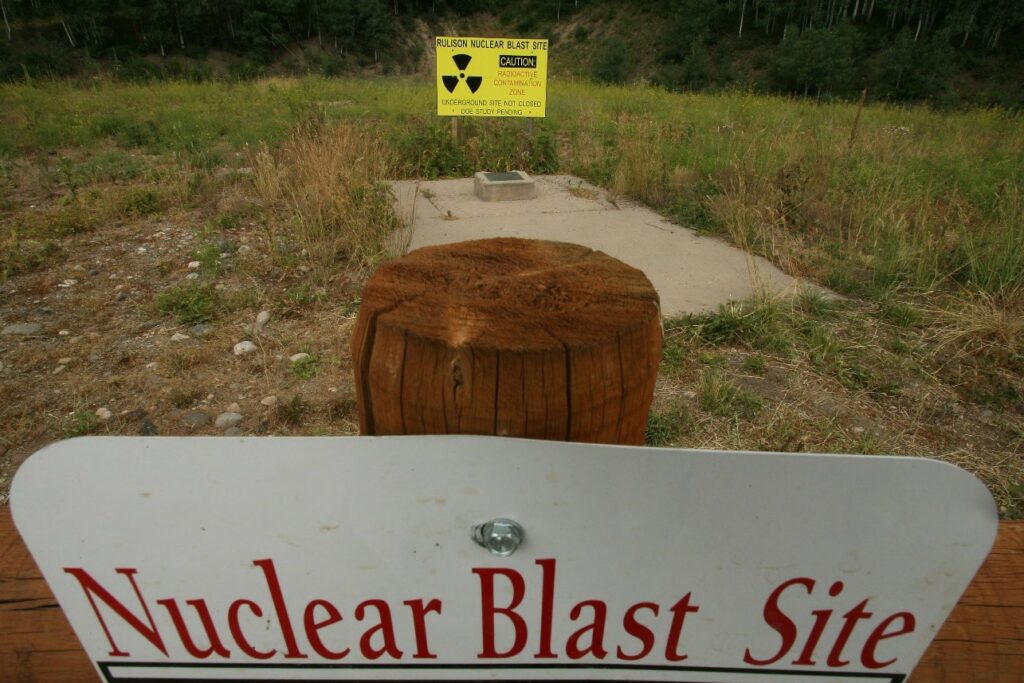by Jessica Chapman
The 700,000 or so Coloradans who went to the polls on November 5, 1974, voted “yes” to all 10 constitutional ballot measures before them. Citizens voted soundly in favor of reinstating the death penalty (which the U.S. Supreme Court had outlawed two years earlier) in certain cases. They voted by an even greater margin to prohibit busing students to schools that were farther away from the closest schools. “School bussing,” as it was known at the time, was a policy designed to desegregate schools when the school’s neighborhoods were still de facto segregated. (Notwithstanding the vote, Denver continued school busing pursuant to a 1973 lawsuit.)
By a thinner yet still decisive margin, Coloradans also voted in favor of an initiative brought by environmental groups to prohibit nuclear detonations in the state unless approved by a vote of the people.
The ballot language voters considered read:
“An act to amend the Constitution of the State of Colorado to establish procedural steps to be complied with prior to the detonation of nuclear explosives devices, requiring prior approval of the detonation by the voters through the enactment of an initiated or referred measure.”
The measure passed, with 58 percent (399,818) voting “yes” and 42 percent (291,284) voting “no,” and resulted in the addition of Article XXVI to the state constitution.
What led to this point? How, exactly, did the question of whether or not to permit nuclear testing end up reaching Colorado voters?
The 1970s marked a time in the state and nation as a whole when Americans were paying more attention to environmental issues. At the federal level, under the administration of President Richard Nixon, the decade ushered in the Environmental Protection Agency, the Endangered Species Act, the National Environmental Policy Act, and the Legacy of Parks program, among others. The first Earth Day was celebrated April 22, 1970.
In Colorado, nuclear energy had become an environmental issue to rally around for a couple reasons. A fire at the Rocky Flats nuclear weapons production facility, eight miles south of Boulder, in 1969 led to a multi-year clean-up and concerns about soil, air, and water contamination.
Meanwhile, the federal Project Plowshare program, which was launched in the 1950s to pursue “peacetime” uses for nuclear energy, had located two sites on Colorado’s Western Slope to test the capability of nuclear weapons to extract natural gas from underground rock. The first, called Project Rulison, involved the detonation of a nuclear device in Garfield County in 1969. The other, called Project Rio Blanco, involved three devices and took place in May 1973, less than a year and a half prior to the November 1974 vote.
Neither Project Rulison nor Project Rio Blanco produced suitable natural gas, and in fact, radiation was detected in the air after the Project Rulison detonation. Such unintended consequences alongside mounting public health concerns about nuclear power built momentum around the issue. (Project Plowshare terminated in 1977.)

Given these elements, the passage of a nuclear ban like Measure 10 seems perhaps unsurprising.
Dr. Derek Everett, a professor of history at Colorado State University explains that, “[T]he nuclear explosion ban in the state constitution emerged at a time when many Coloradans were thinking twice about the environmental impact of development after World War II. Pushback against Rocky Flats, the Rocky Mountain Arsenal, the 1976 Winter Olympics, and other controversies reflected an increasing environmental awareness alongside the nuke ban in 1974.”
Then, as now, citizen groups, or “proponents,” have the option of pursuing placement of issues before voters via the citizen initiative process.
Measure 10, before it became enshrined as Article XXVI of the state constitution, was guided to passage by activists, chief among them a student group called People for Rational Energy Sources. The group gathered enough signatures—50,000+ in this case—to place the ballot language cited above in front of voters on that day in 1974, while also working to promote public awareness of and support for the issue through writing letters, organizing events and otherwise direct attention to the issue.
The citizen initiative is an interesting feature of our state’s constitution—shared by just 25 states other than Colorado—permitting citizens (any citizen) to propose new state laws or constitutional amendments. The mechanics of the process are somewhat complex.
In a 2018 LegiSource article, Office of Legislative Legal Services Director Ed DeCecco provides a useful two-part overview of the initiative process. He explains how proponents of a measure must proceed through a number of steps, including “review and comment,” setting the ballot title, gathering signatures, verification of signatures, and setting language for the Blue Book – all before any issue may be placed on the ballot. The process involves the Legislative Council and the Secretary of State’s office as well as this office. In the decades since Measure 10’s passage, while the General Assembly has introduced bills addressing the feasibility of nuclear energy, the issue has remained more or less untouched and Amendment XXVI has remained intact since its enactment. In fact, despite the widespread use of nuclear power in certain parts of the world, including the United States, Colorado has only ever had one nuclear facility, the Ft. St. Vrain Nuclear Power Plant, which operated from 1979 to 1989.
The General Assembly has made efforts to modify aspects of the citizen initiative process over the years. The language in Article V, Section 1, however, stands: “… the people reserve to themselves the power to propose laws and amendments to the constitution and to enact or reject the same at the polls independent of the general assembly and also reserve power at their own option to approve or reject at the polls any act or item, section, or part of any act of the general assembly.” And the people of the state continue to be asked to approve or deny initiatives, but the people still haven’t gone nuclear.

